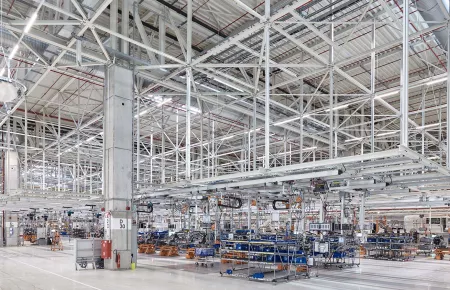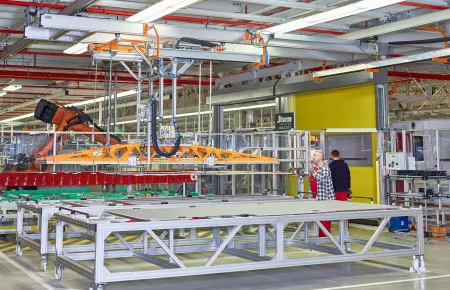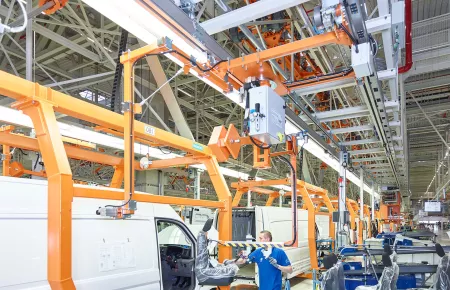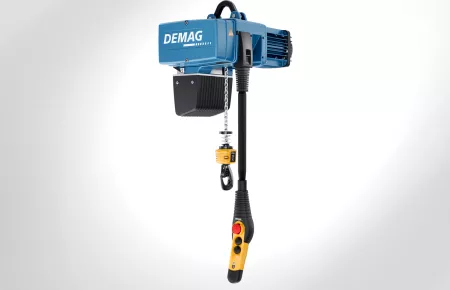
KBK Aluline at VW plant
Ergonomics in commercial vehicle production
KBK Aluline at the VW plant in Września, Poland
Ergonomics in commercial vehicle production
127 crane bridges as well as a wide variety of hoist units, manipulators and power screwdrivers integrated into more than six kilometres of rails in four profile section sizes: Very briefly, that is the scope of the KBK Aluline system that an international Demag project team planned and installed at the new VW plant in Września, Poland. This extremely smooth-running system improves ergonomics for handling parts and is key for optimum productivity throughout the entire vehicle assembly operation.
This is an ideal job for a factory planner: This is an ideal job for a factory planner: a leading international automotive manufacturer builds a completely new plant literally on a greenfield site, and all processes and equipment can be designed from scratch – without any restrictions imposed by existing buildings or pillar dimensions, etc.
In late 2016, Volkswagen AG opened a plant like this to manufacture the latest generation of its VW Crafter in the Polish town of Września, where more than 3,000 employees manufacture the vehicle and – in the integrated supplier park – many third-party components. The plant, built on a property covering 220 hectares, is the Volkswagen Group’s 121st factory. It is designed for an annual capacity of 100,000 light commercial vehicles and has generous workshops for the body line and vehicle assembly as well as a state-of-the-art paint line.
Heavier parts than in car production
On vehicles such as the Crafter, everything is slightly heavier and larger than in a car production line. For this reason, the handling of parts plays a much larger role. Since commercial vehicles are usually made in lower quantities than for car volume models, but in larger numbers of variants, many steps in production cannot be fully automated. Due to the weight of the parts, many stations need to be served by manipulators, workplace cranes and other handling equipment. This applies throughout the entire final assembly process, which is divided up into seven production and pre-assembly sections. Parts for a number of variants are also sequenced, picked and staged in several “supermarkets”. Assembly of the VW crafter is implemented in 155 takt cycles. Components are continuously retrieved from load carriers, lifted or assembled into orders, which requires the use of corresponding lifting and transport equipment to provide the best possible ergonomics for the workers at the individual workplaces.
Demag KBK Aluline provides full coverage
At an early stage, Volkswagen’s planners decided in favour of Demag KBK Aluline as a universal system to be used throughout the assembly operation. There were and are good reasons for this decision. The crane construction kit has delivered optimum performance in the entire automotive industry for more than five decades all over the world. The Demag brand aluminium crane construction kit excels with particularly smooth running characteristics and low rolling resistance. In combination with its light-weight design, these properties offer direct benefits to every worker on a daily basis. The bright and modern appearance of the rail system also ideally matches the friendly workplace design of the new VW plant.
Besides ergonomic aspects, the planners also placed great emphasis on safety and serviceability. KBK Aluline meets both of these requirements in full thanks to Demag’s many years of international experience. In addition, the easily assembled and versatile modular system can be simply extended or converted so that processes and the material flow can be modified at any time.
This flexibility was particularly important from Volkswagen’s point of view, since a single rail system was to be used for all tasks, workplaces and assembly areas on the “one fits all” principle. This also means that a wide variety of manipulators, hoist units and power screwdrivers are installed on the rails to travel along the X-axis and partly also on the Y-axis.
Six kilometres of rails, 127 crane bridges
The result of this planning work can now be experienced live, since production has started at the plant and, wherever you look, you can see the matt silver rails of the KBK Aluline system. The Demag technicians installed more than 6,000 metres of profile-section rails for cranes and crane runways. In total, they installed 127 crane bridges for single and double-girder suspension cranes as well as a wide variety of hoists, manipulators (equipped with lifting columns, pivot arms and balancers) and tools. For its hoist unit needs, Volkswagen also relies on Demag products and decided in favour of the DC range of chain hoists, which are rated for load capacities between 125 and 315 kg and are used with 2 speeds or variable-speed control, depending on the application. The combination of Demag hoist units and Demag rail systems has already proved to be a good solution at other Volkswagen plants, which is why they are also used in Września.
A few examples underline the range of possible applications for the KBK Aluline system in the Crafter production line. Vehicle bodies are transported by a conveyor system at continuous speeds through production. At one station, the cab and sliding doors are removed for pre-assembly on the door pre-assembly line. The 30 kg batteries are also installed here. To do this, the worker uses a single-sided manipulator that has an operating range from 0 to 4,500 mm. Manipulators that are each suspended from two rails are also used to remove the large doors, which weigh up to 85 kg. Rails measuring a total length of 238 metres were installed at this station.
Very diverse requirements – one system
In the drive pre-assembly line, the rails are mainly used to provide workers with the necessary tools, such as pneumatic power screwdrivers. Heavy or large components need to be handled on the bench seat and load compartment base panel assembly line, while often heavy, but compact parts such as leaf springs and shock absorbers have to be precisely positioned on the vehicle assembly line.
Every step of the process has different handling requirements – which can be met without exception with the KBK Aluline system. The same also applies for different height levels and the type of suspension: if they are needed for the horizontal mobility of conventional crane installations that are equipped with chain hoists, suspensions that have articulated joints are used. Rugged ergo suspensions that can accommodate torque and kick-up forces are used for applications with handling equipment and telescoping power screwdrivers.
Regardless of the type of use case, KBK Aluline system rails always provide optimum load capacity for their given deadweight. Four profile-section sizes make it possible to choose the right solution for the relevant application. The special plastic travel rollers provide for extremely smooth and quiet travel characteristics. This also ensures that only little force is required to move them – for optimum ergonomics and a low physical load for the worker. Optional integrated conductor lines can eliminate the need for external power supply lines or unwanted trailing cables. The system’s bright design, in combination with lighting systems that were configured by Volkswagen to meet exacting specifications, enables each workstation to be ideally illuminated.
Good planning for optimum results
It goes without saying that an international corporation will plan a car factory with the utmost precision. In this case, however, the flexibility that resulted in special benefits also needs to be mentioned. During the course of construction, ideas were often jointly developed and implemented to optimise existing plans, which enabled the ergonomics and productivity of individual work-stations to be improved even further.
Close bilingual co-ordination on site as well as the expertise of the Demag project management team and international experience in the realisation of projects of this size all paid off. Demag’s decades of experience gained in the automotive industry and in equipping assembly lines with the KBK system paid off once more.
Image gallery
Image gallery











